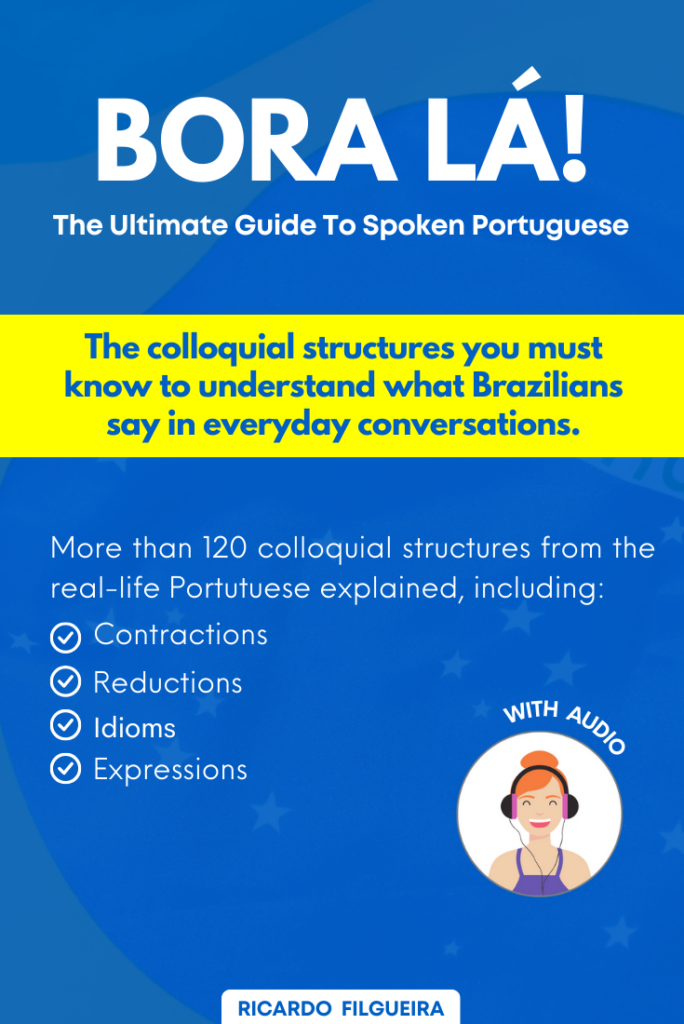The Most Common Expressions and Idioms Used in Brazilian Portuguese
A free AUDIOBOOK with the colloquial structures you must know to understand what Brazilians say in everyday conversations.
Learning a language is not just about understanding grammar rules and vocabulary.
To truly communicate and connect with native speakers, It is crucial to understand idiomatic expressions, contractions, and reductions.
This is where BORA LÁ! comes in. With more than 120 spoken structures explained, this ebook will help you bridge the gap between textbook Portuguese and the dynamic language spoken on the streets of Brazil.
The difference between idiom and expression
Idiom
An idiom is a phrase or a group of words that has a meaning that is different from the literal meaning of the individual words. Idioms are often culturally specific and may not make sense if directly translated word for word.
Examples: spill the beans”, “Kick the bucket”.
Expression
An expression is a broader term that refers to any phrase or combination of words used to convey a particular idea, thought, or feeling. This can include idioms, but also covers a wider range of phrases that might have a more straightforward, literal meaning.
Examples: “long time no see”, “take it easy”.
What you will learn
In this ebook, you will discover a wide range of colloquial structures, including:
- Contractions: Learn how words are often shortened in spoken Portuguese, making conversations flow more naturally.
- Reductions: Understand how Brazilians commonly reduce phrases to their simplest forms.
- Idioms: Explore the colorful idiomatic expressions that add flavor to the language.
- Expressions: Get familiar with expressions that are essential for understanding and participating in everyday conversations.

Here is a small sample of the ebook, link to download full version is down below:
– A –
ABACAXI
- A reforma da casa se transformou em um abacaxi quando descobriram problemas estruturais. (The house renovation turned into a hot potato when they discovered structural problems).
- Resolver o problema do trânsito na cidade é um abacaxi que o prefeito terá que descascar. (Solving the traffic problem in the city is a difficult situation the mayor will have to deal with).
A GENTE
In Brazilian Portuguese, the expression “a gente” is used far more frequently than “nós.” While “nós” is the standard way to say “we” and is taught in formal language settings, “a gente” is preferred in everyday, informal conversations.
This colloquial usage is so prevalent that “a gente” has become the default way of referring to the first person plural in spoken language.
Despite referring to “we”, verbs are conjugated in the third person singular (he/she/it).
- A gente fala português. (We speak Portuguese).
- A gente trabalha aqui. (We work here).
ANIMADO / EMPOLGADO
Excited; enthusiastic;
- Estou muito animado para a viagem de amanhã. (I’m very excited for the trip tomorrow).
À VONTADE
1 – Comfortable; at ease, relaxed.
- Ela está muito à vontade com o novo colega de trabalho. (She is very comfortable with the new coworker).
- Está quente hoje, senhor. Tire esse terno, fique à vontade. (It’s hot today, sir. Take off that suit, make yourself comfortable, at ease).
- Fique à vontade, você está entre amigos. (Make yourself at home, you are among friends).
2 – Unlimited, plentiful, in abundance.
- Vamos passar o dia no parque pra você brincar à vontade! (Let’s spend the day at the park so you can play as much as you want!).
– B –
BACANA Nice, good, cool- Paulo é um cara bacana. (Paulo is a nice guy).
- Sua casa é muito bacana! (Your house is so cool!).
BARRA-PESADA
Dangerous, tough, violent.
- Cuidado com aquele bairro, lá é barra-pesada. (Be careful with that neighborhood, it’s rough there).
- Esse cara é barra-pesada, ele já foi até preso. (This guy is dangerous, he has even been arrested).
BELEZA
1 – Well; fine. Often used as a greeting.
– Oi, tudo bem? (Hi, how are you?).
– Tudo beleza! (Everything’s fine!).
2 – Ok; right; agreed.
- Amanhã eu termino a limpeza do quarto, beleza? (Tomorrow I’ll finish cleaning the room, Ok?).
BICHO
Dude; man.
Literally: animal; bug; beast.
- Bicho, eu não posso fazer isso! (Dude, I can’t do that!).
BOMBAR
To make a huge success; to rock.
- O vídeo dela viralizou e tá bombando nas redes sociais! (Her video went viral and is blowing up on social media!).
BORA
Informal way of saying “let’s go”. It come from the expression “vamos embora” (“let’s leave” or let’s go”). It’s common in casual and friendly conversations.
- Bora beber! = Vamos beber! (Let’s go drink!)
- Bora pra praia? = Vamos pra praia?! (Shall we go to the beach?)
- Bora lá! (Let’s go!).
- A festa acabou, vamos embora. (The party is over, let’s leave).
- Eu nunca mais quero ver você. Vá embora! (I never want to see you again. Go away!).
BROCADO
Very hungry. Expression used in some northern and northeastern states.
- Estou brocado, vamos comer alguma coisa? (I’m starving, shall we eat something?)
BUSÃO
Bus used for public transport.
- Eu vou para o trabalho de busão. (I go to work by bus).
– C –
CABEÇA-DURA
Someone who is stubborn or unwilling to change their mind. It translates to “hard head” and is used to emphasize someone’s inflexibility or obstinacy.
- Pare de ser cabeça-dura e ouça o que estou dizendo. (Stop being stubborn and listen to what I’m saying).
CADÊ
Where is/are? Used to ask about the location or whereabouts of someone or something. It is informal and widely used in everyday conversation.
– Cadê minha carteira? (Where is my wallet?).
– Cadê as fotos? (Where are the photos?).
CARA
Most popular word for man, dude, guy.
Literally: face.
- Este cara é esquisito. (This guy is weird),
CARA DE PAU
Someone who acts without embarrassment or shame, typically in an audacious or shameless manner.
Literally: face of wood.
- Ele se convidou para a festa sem ser chamado, que cara de pau! (He invited himself to the party without being asked, what a bold person!).
- Ele pediu um aumento logo depois de chegar atrasado, que cara de pau! (He asked for a raise right after arriving late, what a shameless person!).
CÊ / CÊS
Colloquial and shortened form of “você”, “vocês”, used informally in spoken language. It is increasingly popular especially in the south and southeast.
- Cê vai sair hoje à noite? (Are you going out tonight?).
- Cês querem mais bolo? (Do you want some more cake?).











